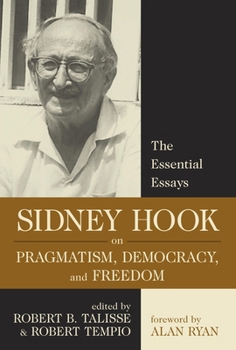Sidney Hook on Pragmatism, Democracy, and Freedom: The Essential Essays
Select Format
Select Condition 
Book Overview
Sidney Hook is arguably America's most controversial intellectual. After beginning his career as this nation's foremost Marxist scholar, he became in the late 1930s the leading anticommunist intellectual and defender of freedom against all forms of totalitarianism. This volume collects twenty-five of Hook's most incisive essays in political philosophy. Clustered into five main sections, the essays discuss pragmatism and naturalism, Marx and Marxism, Democratic theory and practice, and the defense of a free society.In an insightful introduction, editors Talisse and Tempio argue that underlying the wide range of subjects covered by Hook was his unwavering commitment to the "method of intelligence," which contends that any proposal, whether scientific, moral, or political, must be treated as a hypothesis to be confirmed or disconfirmed by the experimental evidence and deliberation of an unfettered community of inquiry. The editors place this methodology at the core of all of Hook's philosophical and political work.This excellent collection makes a superb introduction to the thought of a leading intellectual who for too long has been neglected by mainstream American philosophy.
Format:Paperback
Language:English
ISBN:1591020220
ISBN13:9781591020226
Release Date:October 2002
Publisher:Prometheus Books
Length:456 Pages
Weight:1.65 lbs.
Dimensions:1.3" x 6.3" x 9.4"
Customer Reviews
1 rating
Is there anything this guy didn't see?
Published by Thriftbooks.com User , 21 years ago
Sidney Hook was a preeminent philosopher from the 30's to the 80's, but his essays - from defences of secular humanism and the scientific method, to discourses on the problem with the idea of natural rights - sound like they could've been penned yesterday. This book is probably the best single collection of essays spanning Hook's career and diversity of interest. The first set of essays is on Deweyan pragmatism. Here we have classics like "Naturalism and First Principles", arguing that first principles are not as sacroasanct as philosophers think, "Pragmatism and the Tragic Sense of Life" and "The Place of Reason in an Age of Conflict" - both of which are refreshing reads in an age of absolutism, be it pacifism, Christian fundamentalism or any other trendy -ism floating around. Hook remins us that values can, do, and always will conflict. The place of philosophy is not to naively pretend that a 'system' can eradicate them, but to deal with ithe fact that no theory can. The next section is "Studies in Marxism" and while I can't say that there are any notable highlights here (as I'm nothing of a Marxist or sympathizer) one has to admire how Hook took a pragmatic view of Marxism and if anything, made a "historicist" doctrine a bit more feasible. The next two sections are on Democratic (1) theory and (2) practice. They include classics like "The Democratic Way of Life", "Are There Limits to Freedom of Expression" (where Hook pragmatically answers yes), "Conflicts in Ways of Belief", and for all you that thought Hook was a conservative, "A Critique of Conservatism". In an age where 'democracy' has been taken to mean everything from "freedom" to "equality" to "economic justice" to "fairness", Hook reminds us that democracy is a process and while they may achieve these things, they are synonymous with none of them. Respect for democracy as a process does not mean any particular results - it just means majioritarian representation (which in most cases is a good thing). The last section is "In Defense of a Free Society" which includes such notable essays as "Human Rights and Social Justice", "In Defense of the Cold War" and "The Intellectual in America". All in all, this is a great book. Whether you are just being introduced to Hook, increasing your knowledge of this wonderful thinker, need a brush up, or an expert, this book is an intellectual treat. A gadfly of our time, Hook had the eye of a hawk, the pen of a true intellectual, and the polemics of a champion.





